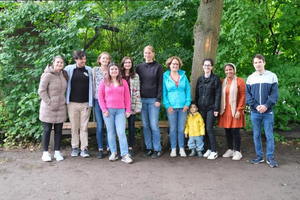Vascular factors of mental health resilience
1 PhD project offered in the IPP summer call Molecular Biomedicine & Ageing
Scientific Background
Stress is a significant risk factor for the development of mental health problems, in particular depression and post traumatic stress disorder (PTSD). However, even after substantial stress exposure many people show resilience and do not develop severe mental health issues. We are using a mouse model for chronic social defeat stress to analyse the mechanisms underlying mental resilience.
As shown by several groups the permeability of the blood brain barrier (BBB) seems to play a critical role in mental resilience. Particularly in the nucleus accumbens and in the hippocampus exposure to chronic social defeat leads to an increase of the permeability of the BBB, which results in an entry of immune active cells into the brain parenchyma and is associated with an increase in susceptibility. In a single cell RNA sequencing of different parts of the hippocampus that we have carried out together with the groups of Beat Lutz and Susanne Gerber, has confirmed that it is the non-neuronal cells and the vascular endothelium in the dorsal hippocampus that are involved in adaptation processes after exposure to chronic social defeat stress.
PhD Project: Vascular factors that influence mental resilience
In further steps we are analysing the role of endothelial signaling, activated immune-cells and the coagulation system in mental resilience and susceptibility in response to stress. We are working in close collaboration with the group of Wolfram Ruf, an expert in vascular biology and Amparo Acker-Palmer from Frankfurt, who is experienced in the neurovascular niche. We are working with several stress models in mice.
If you are interested in this project, please select Susann Schweiger (MetRes) as your group preference in the IPP application platform.
Publications relevant to this project
Vennin C, Hewel C, Todorov H, Wendelmuth M, Radyushkin K, Heimbach A, Horenko I, Ayash S, Müller MB, Schweiger S, Gerber S, Lutz B. (2022) A Resilience Related Glial-Neurovascular Network Is Transcriptionally Activated after Chronic Social Defeat in Male Mice. Cells 11(21):3405. Link.
Wendelmuth M., Willam M., Todorov H., Radyushkin K., Gerber S., Schweiger S. (2020) Dynamic longitudinal behavior in animals exposed to chronic social defeat. PLoS one. 15(7):e0235268. Link.
Dion-Albert L, Cadoret A, Doney E, Neutzling Kaufmann F, Dudek K A, Daigle B, Parise L F, Cathomas F, Samba N, Hudson N, Lebel M, Signature Consortium, Campbell M, Turecki G, Mechawar N, Menard C (2022). Vascular and blood-brain barrier-related changes underlie stress responses and resilience in female mice and depression in human tissue. Nat Commun 13:164 Link
Menar C, Pfau M L, Hodes G E, Kana V, Wang V X, Bouchard S, Takahashi A, Flanigan M E, Aleyasin H, LeClair K B, Janssen W G, Labonté B, Parise E M, Lorsch Z S, Golden S A, Heshmati M, Tamminga C, Turecki G, Campbell M, Fayad Z, Tang C Y, Merad M, Russo S. (2017) Social stress induces neurovascular pathology promoting depression Nat Neurosci 20(12):1752-1760 Link
